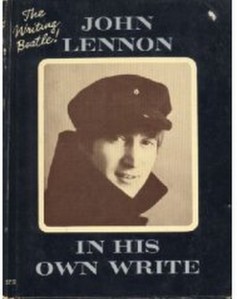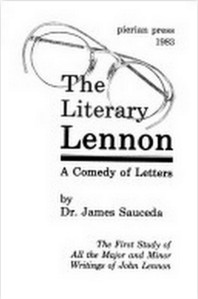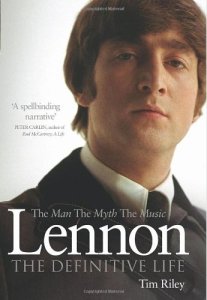 March
23
March
23
Tags
John Lennon: James Joyce’s Illegitimate Son?
 On the 23rd of March 1964, In His Own Write by John Lennon was first published. The book was the first solo Beatle project in any form that turned out to be an instant success. Printed initially by Jonathan Cape of Great Britain, it sold only in England 50,000 copies on the first day. In America, printed by Simon & Schuster, the book sold 90,000 copies. The original cover photo of John Lennon was taken by Robert Freeman. In 1968, In His Own Write was adapted into a one-act play, co-authored and directed by Victor Spinetti, and staged at the Old Vic Theatre on Waterloo Road in London. Its premiere on the 18th of June 1968 drew public attention mostly for the fact that Lennon and Yoko Ono appeared for the first time publicly as a couple. “Photographers shouted out, “Where is your wife?” as the two entered the theatre, but the best reply that the usually witty John could offer was “I don’t know.”” (Jacqueline Edmondson, John Lennon: A Biography).
On the 23rd of March 1964, In His Own Write by John Lennon was first published. The book was the first solo Beatle project in any form that turned out to be an instant success. Printed initially by Jonathan Cape of Great Britain, it sold only in England 50,000 copies on the first day. In America, printed by Simon & Schuster, the book sold 90,000 copies. The original cover photo of John Lennon was taken by Robert Freeman. In 1968, In His Own Write was adapted into a one-act play, co-authored and directed by Victor Spinetti, and staged at the Old Vic Theatre on Waterloo Road in London. Its premiere on the 18th of June 1968 drew public attention mostly for the fact that Lennon and Yoko Ono appeared for the first time publicly as a couple. “Photographers shouted out, “Where is your wife?” as the two entered the theatre, but the best reply that the usually witty John could offer was “I don’t know.”” (Jacqueline Edmondson, John Lennon: A Biography).
In His Own Write featured several genre parodies, including letters to the editor, school lessons and scripts. It contained 31 stories in total and numerous pen drawings by Lennon. But what attracted particular attention, was the book’s experimental loose style dividing Lennon fans into two groups – those claiming the book was an utter literary gibberish and those who found brilliance in hidden meanings of Lennon’s puns and neologisms. “…Lennon’s verse boasts such a loopy, scabrous energy people overlooked how much subversion lay embedded in its cryptic asides. Two quotes followed this first publication around. The first came from a review from London’s Times Literary Supplement: “It is worth the attention of anyone who fears for the impoverishment of English language and British imagination.” (Not many read the succeeding phrase: “Humorists have done more to preserve and enrich these assets than most serious critics allow.”) The other comes from Lennon himself, who arrived hungover to accept the Foyles Literary Prize at a luncheon, unaware that he was expected to give a formal speech. “Thank you, you’ve got a lucky face” was how the press quoted his mumbled thank-you, and the fiasco, a narrowly fumbled embarrassment, scored as a win.” (Tim Ridley, Lennon: The Man, the Myth, the Music – The Definitive Life).
and those who found brilliance in hidden meanings of Lennon’s puns and neologisms. “…Lennon’s verse boasts such a loopy, scabrous energy people overlooked how much subversion lay embedded in its cryptic asides. Two quotes followed this first publication around. The first came from a review from London’s Times Literary Supplement: “It is worth the attention of anyone who fears for the impoverishment of English language and British imagination.” (Not many read the succeeding phrase: “Humorists have done more to preserve and enrich these assets than most serious critics allow.”) The other comes from Lennon himself, who arrived hungover to accept the Foyles Literary Prize at a luncheon, unaware that he was expected to give a formal speech. “Thank you, you’ve got a lucky face” was how the press quoted his mumbled thank-you, and the fiasco, a narrowly fumbled embarrassment, scored as a win.” (Tim Ridley, Lennon: The Man, the Myth, the Music – The Definitive Life).
Soon, the term ‘Joycean’ was ascribed to Lennon’s writing and his prose became the subject of serious literary analysis. An American Joyce scholar, James Sauceda, dedicated his book, The Literary Lennon: A Comedy of Letters, to proving Lennon as an apt user of Joyce’s Finnegans Wake language.“Tortured spelling turn into puns, and word mashing creates poetry out of unlikely collisions. Instead of “witty,” Lennon writes “writty,” mashing “witty” and “writing” or “written” into a single pregnant word. Sauceda notes how a lot of this overlaps with some of Joyce’s own wordplay, including  some key words like “bored” for “born” in Finnegans Wake, so the serendipities can be striking. But they are only serendipities. Similarly, in “All Abord Speeching,” “abord” can mean both “about” and “aboard,” and “speeching” enfolds both “speaking” and “teaching.” Sauceda notes how many details Lennon gets correct in his gibberish back-cover autobiographical sketch, “About the Awful,” like Hitler’s single testicle (which Lennon calls a “Heatlump,” neatly combining the physical attribute and the reverse reproductive imperative). (Riley).
some key words like “bored” for “born” in Finnegans Wake, so the serendipities can be striking. But they are only serendipities. Similarly, in “All Abord Speeching,” “abord” can mean both “about” and “aboard,” and “speeching” enfolds both “speaking” and “teaching.” Sauceda notes how many details Lennon gets correct in his gibberish back-cover autobiographical sketch, “About the Awful,” like Hitler’s single testicle (which Lennon calls a “Heatlump,” neatly combining the physical attribute and the reverse reproductive imperative). (Riley).
Joycean influences have been also noted in Lennon’s 1967 song I am the Walrus. In her article ‘Not a Leetle Beetle’ (James Joyce Quarterly, Vol. 6, No. 3, Spring, 1969), Ruth von Phul provided a thorough analysis of the song in relation to Joyce’s writing. According to her, even “…the first line of Lennon’s song sounds Joyce’s perennial theme: “I am he as you are me and we are all together,” while four times the refrain says: “I am the eggman, they are the eggmen – I am the walrus.” There are similarities in many places in both Lennon’s and Joyce’s work, suggesting Lennon’s familiarity with the oeuvre of the famous Irish writer. But the truth is that Lennon had never read anything by Joyce before his literary epiphanies. And when he finally did, he said that “It was like finding Daddy.” (Riley).
Film Credit: beatlesfanss










Very intriguing. I haven’t read James Joyce or Lennon’s book but I am a great Lennon fan and have bought a huge book of his letters. Just need to read it. You have motivated me to get cracking!
LikeLiked by 1 person
As a part time Lennon fan and a full time Joyce lunatic – I think you for posting this… I had never considered how the two were similar! But now I see it.
LikeLiked by 1 person
Thanks Becks, good to hear from you!
LikeLike
Reblogged this on Lenora's Culture Center and Foray into History.
LikeLike
If the wordplayful writings of Lennon and Joyce–as well as that by Lewis Carroll and Edward Lear–tickle your punnybone, please check this out:
LikeLike
Reblogged this on Greek Canadian Literature.
LikeLike